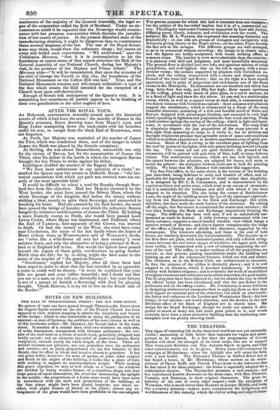AFTER THE ROYAL TOUR.
AT Holyrood, conversation naturally turned upon the historical events of which it had been the scene : the murder of Rizzi° in the Queen's presence, KNOX drawing tears from MART'S eyes, and King JAMES scampering down the back-stairs with his breeches under his arm, to escape from the black Earl of BOTHWELL, were not forgotten.
At Perth, her Majesty was reminded of the murder of JAMES the First, which was committed there, and of the danger in which JaraEs the Sixth was placed by the Gowrie conspiracy.
At Stirling, she was shown Bannockburn, memorable not only for the victory of BRUCE, but for the assassination of JAMES the Third, after his defeat in the battle in which the insurgent Barons brought the boy Prince to strike against his father. Linlithgow recalled the murder of the Regent Muansv. "We have been unfortunate in our selection of a route," re- marked the Queen upon her return to Dalkeith House : "the his- torical associations with which our path was strewed were not ex- actly of the most agreeable kind."
It would be difficult to select a road for Royalty through Scot- land free from this objection. Had her Majesty entered it by the West border, she must have passed the Solway Moss, where the whole Baronage of the kingdom fled before the enemy without striking a blow, merely to spite their Sovereign, and succeeded in breaking his heart. Had she entered by the East border, she must have passed the bridge of Lauder, over which the refractory Barons hanged the ministers and favourites of JAhiES the Third. By holding a more Easterly course to Perth, she would have passed Loch Leven Castle, where MARY was imprisoned, and Falkland, where the Earl of Csanicx, heir-apparent of the Crown, was starved to death. Or had she turned to the West, she must have come near Crookstone, the scene of the last battle where the hopes of MARY (whose woes, as WORDSWORTH said of WALLACE'S deeds, are "sown like a wild-flower all over her dear country") were stricken down, and only the alternative of being a prisoner in Scot- land or in England left to her. Nor would the Queen have passed beyond the region of these grisly recollections by going further North than she did ; for by so doing might she have come to the scene of the murder of "the gracious Duncan."
"Gentlemen," replied her Majesty, after all these facts had been urged in order to show that she had travelled by as agreeable a route as could well be chosen, "it must be confessed that your hills are grand and your yanks beautiful ; and I doubt not that you are to a man, as you tell me, devotedly loyal : but your history is not of a nature to furnish a Sovereign with food for pleasing thought. Thank Heaven, it is my lot to live on the South side of the Border !"


























 Previous page
Previous page